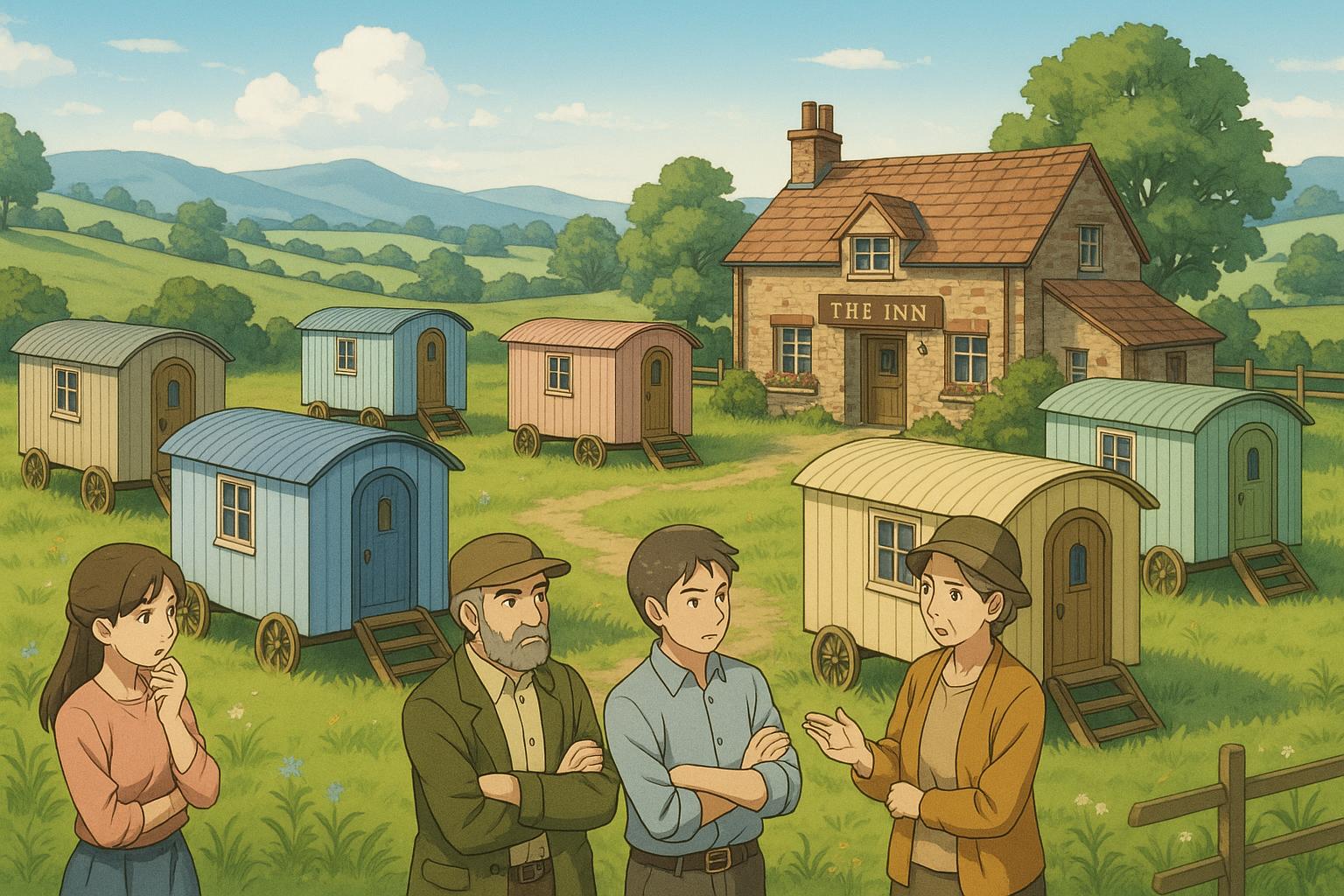A proposal to build six glamping pods near The Black Horse pub in Walberton has been paused after errors in land ownership documentation were discovered, highlighting the complex challenges in rural planning and community response.
Plans for a glamping site near The Black Horse pub in Walberton, West Sussex, have been halted due to complications with ownership documentation. Originally submitted to Arun District Council on March 19, 2025, the proposal sought to establish six holiday-let glamping pods on equestrian land behind the pub, part of the expansive 280-hectare Binsted Farm. However, the planning process encountered roadblocks when errors in the ownership certificate came to light, leading to a temporary suspension of the application.
Harry Chalk, a senior planning officer at Arun District Council, communicated the issue in an email on May 12, emphasising that the certificate inaccurately identified the applicant as the sole owner of all relevant land. The confusion arose from a section of the site being unregistered, necessitating the submission of additional documentation. A follow-up email from Chalk on May 22 confirmed that the required information had been filed, allowing the application to progress but underscoring the complexities often involved in planning approvals.
The concept of the glamping pods—described as ‘shepherd’s huts’—has garnered mixed reactions from locals. Advocates highlight the growing need for farmers to diversify their income streams amid challenges such as price volatility and regulatory changes that have strained the agricultural sector. Letters of support from 11 local business owners indicate a belief in the potential economic benefits of increased tourism in the area.
Conversely, objections have surfaced from community members who voice concerns over noise and disruption. One resident remarked, “This is a very strange and damaging site for glamping, with all the noise and stag and hen parties it would no doubt encourage.” Another objector, living in close proximity, expressed worries about the potential influx of noise from outdoor hot tubs and the additional traffic congestion from pub-goers. These contrasting opinions reflect a broader tension in many rural areas as they navigate the impacts of tourism development.
The climate around glamping and rural tourism is currently evolving, as evidenced by other recent proposals across West Sussex. For instance, a site in Chichester is awaiting council approval for similar developments, and Wintons Fishery has submitted plans to build glamping cabins to diversify its operations. These varying projects illustrate a rising trend among landowners to capitalise on the demand for unique holiday experiences while addressing economic pressures within the agricultural community.
The glamping proposal at The Black Horse pub awaits further clarification on property ownership before moving ahead, encapsulating the complexities and community dynamics that often accompany planning applications in rural areas.
 Reference Map:
Reference Map:
Source: Noah Wire Services
- https://www.theargus.co.uk/news/25208880.plans-glamping-pods-near-west-sussex-pub-put-hold/?ref=rss – Please view link – unable to able to access data
- https://www.sussexexpress.co.uk/news/people/tip-off-over-glamping-pod-in-sussex-village-lands-owner-in-planning-tangle-4524748 – In February 2024, a glamping pod in Rudgwick, West Sussex, was reported to Horsham District Council by an anonymous tip-off. The council informed the owner, Frances Kerr, that planning permission was required for the structure. Kerr’s agents stated that the pod was intended for personal use by friends and family, not as a commercial venture. They also noted that the pod was minimally visible from public areas and neighbouring properties. Retrospective consent was being sought to retain the pod and an annex used as a gym.
- https://moderncampground.com/proposed-glamping-pods-at-former-chichester-watercress-farm-await-council-decision/ – In October 2024, a proposal was submitted to Chichester District Council to convert the former Chichester Watercress Farm into a glamping site. The plan included six glamping pods offering short-term holiday stays during school holidays and bank holiday weekends from March to May and October to December, with full-time operation planned from June to September. The council was set to decide on the proposal by October 31, 2024.
- https://moderncampground.com/wintons-fishery-seeks-approval-for-glamping-cabins-to-diversify-operations/ – In April 2025, Wintons Fishery, located on the outskirts of Burgess Hill, submitted a planning application to construct three timber glamping cabins. The proposal aimed to diversify the existing carp and catfish fishing business by providing countryside holiday accommodation for tourists seeking short breaks and weekend stays. The application included associated infrastructure such as permeable footpaths, timber decking, and new drainage systems.
- https://moderncampground.com/sussex-glamping-proposal-seeks-approval-for-high-end-pods-near-hastings/ – In March 2025, a planning application was submitted for a small-scale glamping development near Hastings, Sussex. The proposal aimed to introduce three high-end glamping pods on an unused field, operating year-round to cater to tourists seeking a countryside escape. The site was intended to be discreet and sustainable, with natural vegetation providing screening from public roads and nearby homes. The application emphasized the growing demand for rural accommodation and the potential economic benefits for local businesses.
- https://www.sussexexpress.co.uk/news/politics/glamping-pods-in-bolney-countryside-are-refused-permission-3527783 – In January 2022, Mid Sussex District Council unanimously refused plans to set up three glamping pods at Stonerocks Farm in Bolney, West Sussex. The 3-meter-high pods were described as ‘posh sheds’ by a councillor, and concerns were raised about their impact on the Area of Outstanding Natural Beauty. The committee also heard objections regarding fire safety, lack of facilities, traffic, and the potential for setting a precedent for more pods to be built in the area.
- https://www.sussexexpress.co.uk/news/politics/bolney-farm-owner-disappointed-at-refusal-of-glamping-pods-plan-3559014 – Following the refusal of the glamping pods plan in January 2022, James Lea, the owner of Stonerocks Farm in Bolney, expressed disappointment and intended to appeal the decision. He emphasized the effort put into the application, including hiring a landscape architect and enhancing the local landscape. Lea highlighted the ambition to breathe new life into the farm, which had been underused for the past decade, and to generate modest income to reinvest back into the site.













